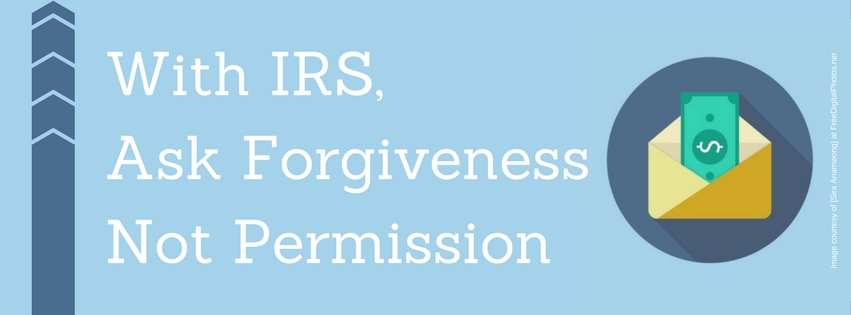In an article on Forbes.com, Robert W. Wood writes how on the old proverb “it’s better to ask for forgiveness than to ask for permission” can be used when dealing with the IRS.
It isn’t a crazy concept. After all, do you want to call the IRS? Doing so is usually an exercise in frustration. In person office visits are likely to be too. Besides, you generally cannot rely on any tax advice IRS employees dish out. That makes the process of soliciting and getting answers to your tax questions, well, questionable.
What about more formal inquiries to the IRS, where you can rely on their guidance? That is worth examining, too. Sometimes, asking in advance may not be as sensible as you might think. Consider Yahoo. In 2015, Yahoo CEO Marissa Mayer announced a tax savvy spinoff plan for Yahoo’s remaining 384 million shares in Alibaba. At the time, the shares were worth $23 billion. Yahoo asked the IRS nicely for permission. Eventually, the IRS revealed that it would not issue a private letter ruling, an advance blessing from the IRS.
Plainly, the fact that the IRS will not rule did not prove that the deal would be taxable. But if you ask for a ruling you can’t get, the IRS certainly knows about your plans! There is quite a chilling effect if you ask for a ruling and do not get it. If you go ahead with the deal, it could be asking for trouble. In Yahoo’s case, there was talk that maybe it would rely on a tax opinion instead of a private letter ruling. Rulings are binding on the IRS, tax opinions are not. A tax opinion can be written on just about anything. In contrast, the IRS has lists of subjects on which it will not rule.
If the topic of your question is on an IRS no-rule list, you can forget asking. If the law is unclear and you really need a ruling, you may not be able to get it. If the law is settled, and you are perceived as too needy for comfort, you generally can’t get that either. Many taxpayers feel the middle ground—where you can get an IRS ruling—is generally where you do not need one! Besides, one generally should not ask the IRS for a ruling unless there is a high likelihood you can get it.
There are consequences for asking. When you request a ruling, you generally must pay a fee. There is a range of fees, but a common fee is $28,300. If the IRS answer is no, practitioners customarily withdraw their ruling request and may get their fee back. You don’t want a “no” answer on the books. But, if the IRS says it can’t rule and you withdraw your request, the IRS sends an audit notice to the IRS field office in your area. The notice says you asked for a ruling, didn’t get it, and withdrew your request. If you proceed with the transaction, your return could be flagged.
And then there is timing. A ruling may take six months or more. A tax opinion can be knocked out in days or weeks. Today, most IRS rulings are preceded by an informal trial run. You talk to the IRS and get their general view on your proposed ruling. The IRS meets informally in person or by phone, generally with 2 to 5 IRS attorneys covering different aspects of the topic. The IRS reacts orally, and if all is positive, you prepare and submit your ruling request.
If not, you don’t. Either way, the informal request is not official and triggers no fee. If it does not go well and you never make a formal ruling request, it triggers no audit notice. If the dollar consequences of being wrong are catastrophic, a ruling is best. But sometimes, you cannot get a ruling, and should not ask. A tax opinion can often give them protection from IRS penalties, and even help you prevail in the event of an audit.
So what do we learn from Robert Wood’s blog? Try to get as much information as you can informally, so that you don’t have to pay large fees to get a ruling, nor trigger an audit flag, but give you the advice you need to help you make your decisions.
The author, Robert W. Wood, is a tax lawyer based in San Francisco. He enjoys working with lots of different tax issues and has written over 30 tax related books. His best seller is Taxation of Damage Awards and Settlement Payments. You can also read many of his tax articles on Forbes.com.
